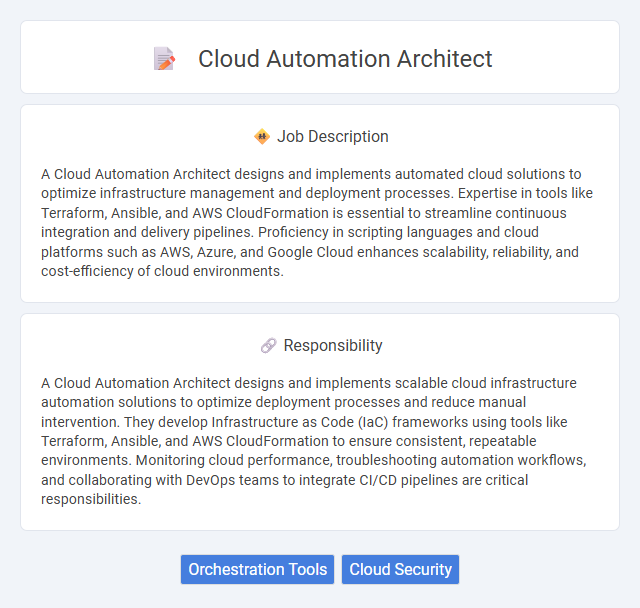
A Cloud Automation Architect designs and implements automated cloud solutions to optimize infrastructure management and deployment processes. Expertise in tools like Terraform, Ansible, and AWS CloudFormation is essential to streamline continuous integration and delivery pipelines. Proficiency in scripting languages and cloud platforms such as AWS, Azure, and Google Cloud enhances scalability, reliability, and cost-efficiency of cloud environments.
Individuals with strong skills in cloud computing, automation tools, and system architecture will likely thrive as Cloud Automation Architects. Those who enjoy problem-solving, continuous learning, and working in fast-paced, collaborative environments probably find this role suitable. Conversely, people who prefer routine tasks or have limited technical expertise might struggle to adapt to the dynamic demands of this position.
Qualification
A Cloud Automation Architect requires expertise in cloud platforms such as AWS, Azure, or Google Cloud, combined with deep knowledge of infrastructure as code (IaC) tools like Terraform, Ansible, and CloudFormation. Proficiency in programming languages such as Python, PowerShell, or Bash scripting is essential for developing automation workflows and integrating cloud services. Strong experience in CI/CD pipelines, container orchestration (Kubernetes, Docker), and a solid understanding of security best practices are critical qualifications for this role.
Responsibility
A Cloud Automation Architect designs and implements scalable cloud infrastructure automation solutions to optimize deployment processes and reduce manual intervention. They develop Infrastructure as Code (IaC) frameworks using tools like Terraform, Ansible, and AWS CloudFormation to ensure consistent, repeatable environments. Monitoring cloud performance, troubleshooting automation workflows, and collaborating with DevOps teams to integrate CI/CD pipelines are critical responsibilities.
Benefit
A Cloud Automation Architect can significantly increase operational efficiency by designing automated workflows that reduce manual intervention and errors. Companies may experience cost savings through optimized resource allocation and faster deployment times. The probability of enhanced scalability and improved compliance also tends to rise with effective cloud automation strategies.
Challenge
A Cloud Automation Architect likely faces the challenge of integrating complex cloud environments with automated processes while ensuring scalability and security. Balancing rapid deployment requirements with robust system reliability may present ongoing difficulties. Navigating evolving cloud technologies and aligning automation strategies with business goals probably requires continuous adaptation and problem-solving skills.
Career Advancement
Cloud automation architects drive transformative digital solutions by designing scalable, efficient cloud infrastructures using tools like Terraform, Ansible, and Kubernetes. Mastery in cloud platforms such as AWS, Azure, and Google Cloud accelerates career growth, opening opportunities for senior roles like Cloud Solutions Architect or DevOps Manager. Continuous skills development in AI integration and security automation enhances leadership prospects within enterprise IT and cloud consulting firms.
Key Terms
Orchestration Tools
A Cloud Automation Architect specializing in orchestration tools designs and implements automated workflows to streamline cloud infrastructure management and deployment processes. Expertise in orchestration platforms like Kubernetes, Terraform, and Ansible enables efficient resource provisioning, configuration management, and service integration across multi-cloud environments. Mastery of these tools reduces operational costs, accelerates application delivery, and ensures consistent, scalable cloud infrastructure automation.
Cloud Security
A Cloud Automation Architect specializing in cloud security designs and implements automated frameworks to safeguard cloud environments against evolving cyber threats. They develop infrastructure-as-code solutions integrating advanced security protocols, encryption standards, and continuous compliance monitoring across multi-cloud platforms. Expertise in tools like Terraform, AWS Security Hub, and Azure Security Center ensures optimized protection and efficient incident response within dynamic cloud ecosystems.
 kuljobs.com
kuljobs.com